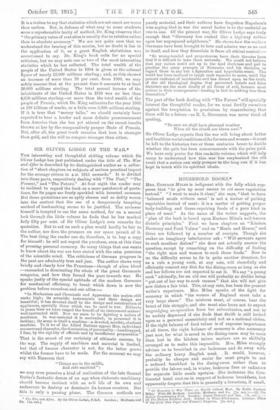SIR OLIVER LODGE ON THE WAR.*
THE interesting and thoughtful shilling volume which Sir Oliver Lodge has just published under the title of The War and After is described by its distinguished author as a collec- tion of "short chapters on subjects of serious practical import for the average citizen in A.D. 1915 onwards." It is divided into three parts, respectively dealing with " The Past," " The Present," and "The Future." At first sight the reader may be inclined to regard the book as a mere patchwork of quota- tions, for its pages are freely speckled with inverted commas. But these quotations are so aptly chosen and so deftly woven into the context that the use of a dangerously tempting method of bookmaking seems to be justified. The reviewer himself is tempted to use the same method, for on a second look through the little volume he finds that be has marked fully fifty per cent. of Sir Oliver Lodge's own remarks for quotation. But to act on such a plan would hardly be fair to the author, nor does the pressure on our space permit of it. The best thing the reader can do, therefore, is to buy a copy for himself he will not regret the purchase, even at this time of pressing personal economy. So many things that one wants to know about the war are here stated with the calm precision of the soientific mind. The criticisms of German progress in the past are admirably true and just. The author shows very briefly and clearly how the Prussians—though of alien blood —succeeded in dominating the whole of the great Germanic congeries, and how they forced the pace towards war. He speaks justly of the special aptitude of the modern Germans for mechanical efficiency, to break which down is now the problem before ourselves and our allies "In Mechanism and Chemicals and Apparatus the nation still ranks high; its scientific instruments and their design are beautiful; it has devoted itself to the design and construction of appliances, specially those which can be used in war. Hitherto in peace time we have reaped the benefit of its instrument makers' well-instructed skill. Now we seem to be fighting a nation of machines, In war-material it is unrivalled; in personnel it is lacking; its army is itself a machine—a devoted, terrible, obedient machine. To it we of the Allied Nations oppose Mon, individual resource and character, the domination of pereonality—handicapped, I fear, by the rigidity of officials and by insufficient preparation."
That is the secret of our certainty of ultimate success, by the way. The supply of machines and material is limited, but that of human character is not, for the latter grows whilst the former have to be made. For the moment we may say with Emerson that "Things are in the saddle, And ride mankind":
we may even perceive a kind of realization of the late Samuel Butler's fantastic dream of an age when elaborate machinery should become instinct with an evil life of its own and endeavour to destroy cr dominate its human creators. But this is only a passing phase. The German methods are * The War and After. By Sir Oliver Lodge, F.B.A. London; Methuen and Co. Fla, net.1 purely material, and their authors have forgotten Napoleon's wise saying that in war the moral factor is to the material as two to one. Of the present war, Sir Oliver Lodge says truly
enough that "Germany has rushed like a highway robber upon her unprepared neighbours." He shows how the mottern
Germans have been brought to love and admire war as an end in itself, and how they dissociate it from all ethical control :- " So wrong-headed and preposterous have their theories been that it is difficult to take them sorieuely. We could not believe that any nation could act up to the mad doctrines and put in practice tho crazy precepts of Nietzsche and his disciples, or regard them in any but a figurative and hyperbolic sense. The world has boon inclined to laugh such vagaries to scorn, until the present outburst of intolerable evil has forced upon us the truth of the old theological dogma that perverted beliefs and false doctrines are the most deadly of all forms of evil, because most serious in their consequences—leading in fact to nothing less than damnation."
The part of the book dealing with "The Future" will specially interest the thoughtful reader, for we must fortify ourselves against the temptation to pessimism by remembering that there will be a future—as R. L. Stevenson was never tired of quoting,
"Be sure we shall have pleasand weather When all the clouds are blown awa',"
Sir Oliver Lodge expects that the war will bring about better and healthier social conditions alike for men and women—it must be left to the historian two or three centuries hence to decide
whether the gain has been commensurate with the price paid. We have only praise for this readable volume, which will help many to understand how this war has emphasized the old truth that a nation can only prosper in the long run if it has kept in touch with its spiritual ideals.






































 Previous page
Previous page